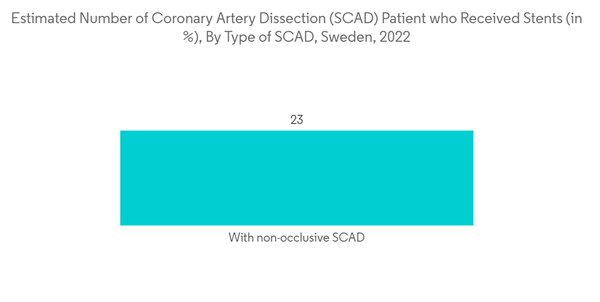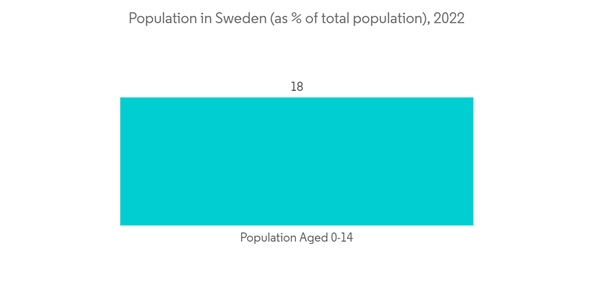The COVID-19 pandemic affected the studied market significantly. Since the pandemic's beginning, Sweden's healthcare systems interrupted usual care in many healthcare facilities, exposing vulnerable patients with cardiovascular diseases to significant risks. However, as COVID-19 was considered a probable risk facas considered a probable risk factor for acute cardiovascular complications, the demand for cardiovascular devices increased during the pandemic in the country. For instance, according to the article published by PubMed in July 2021, a study was conducted in Sweden, which showed that COVID-19 was found to be a risk factor for acute myocardial infarction and ischaemic stroke in the country. Thus, there was an increased risk of cardiovascular diseases (CVD) among the target population in Sweden. Owing to the country's burden of heart diseases, cardiovascular devices used for diagnosis and treatment increased. Thus, the pandemic had a significant impact on the studied market. However, as the pandemic has subsided, cardiac care has returned to normal, so the studied market is expected to have stable growth during the forecast period of the study.
Factors such as rapid technological advancements, the increasing burden of CVD, and increased preference for minimally invasive procedures are projected to drive the demand for cardiovascular devices in Sweden, driving the market growth.
Cardiovascular disease (CVD) is Sweden's leading cause of healthcare burden. The prevalence and incidence of the disease are increasing with time. According to the article published by PubMed in March 2022, when the research was conducted in primary healthcare centers in southern Sweden, the overall prevalence of heart failure (HF) was 2.06%. The source also stated that age and the degree of multimorbidity increase the prevalence of HF, and 99.07% of the patients with HF were associated with multimorbidity. Thus, such a high burden and persistent risk of CVD among the target population in Sweden is expected to demand cardiology medical devices for treatment and diagnosis, thereby driving the market growth.
The increasing mergers and acquisitions of products and services and product innovations fuel market growth. For instance, in June 2022, Coala-Life Group AB, a Swedish medical technology company, agreed to acquire 100% of the shares in Vitrics Management Group Inc. for a purchase price of USD 4.5 million on a cash and debt-free basis. Vitrics' platform and customer base will be able to be scaled up through Coala's national sales force, enable faster organic growth, and effectively get the Coala Heart Monitor out to even more patients in need.
Therefore, the factors above are expected to contribute to the growth of the cardiovascular devices market in Sweden. However, stringent regulatory systems and the high cost of devices and procedures might hamper the market's growth over the analysis period.
Sweden Cardiovascular Devices Market Trends
Stents by Therapeutic and Surgical Devices Sub-Segment is Expected to Witness Growth Over the Forecast Period
A stent is a cardiovascular device that resembles a tiny coil of wire mesh and supports the artery's walls, aids in preventing it from re-narrowing and is used during angioplasty. These are currently used most frequently in most patients undergoing angioplasty. Once implanted, stents are designed to be permanent and keep patients' arteries open. Thus, the stent by therapeutic and surgical devices segment is anticipated to gain demand and witness growth over the analysis period.According to the research article published by BMJ Open in June 2022, when the study was conducted nationwide to observe the incidence, contemporary management, and outcome in Swedish spontaneous coronary artery dissection (SCAD) patients, 30.6% of SCAD patients received stents, 65.5% of SCAD patients with 100% coronary artery occlusion who underwent percutaneous coronary intervention (PCI) were treated with stent implantation, and 23% of patients with non-occlusive SCAD were treated with stent implantation in Sweden. Thus, this shows a high adoption of stents in the country. This is further anticipated to drive the segment's growth over the forecast period. Additionally, frequent product launches, innovations, and advancements are other factors expected to fuel market growth.
Therefore, the factors mentioned above, such as the rising usage of cardiovascular stents and the increasing prevalence of cardiovascular diseases, are expected to drive the segment's growth significantly and contribute to the overall market growth over the forecast period.
Remote Cardiac Monitoring Segment is Expected to Hold a Significant Share in the Market Over the Forecast Period of the Study
Remote cardiac monitoring (RCM) devices are at-home devices that enable electrocardiographic (ECG) monitoring for patients suffering from cardiovascular disease. Then, the device electronically transfers the data to the healthcare team. The increasing prevalence of cardiovascular diseases in Sweden, the rising geriatric population, and the rising developments by key market players are expected to boost segment growth.The increasing prevalence of cardiovascular diseases in Sweden is a major factor in increasing the adoption of RCM devices. For instance, according to an article published by Elsevier in November 2022, a cohort study was conducted in Sweden, which showed an association between long-term exposure to traffic-related air pollutants and the development of atherosclerosis in a middle-aged population. Thus, the increasing burden of cardiovascular diseases such as atherosclerosis is expected to boost segment growth.
Moreover, the rising developments by various players are also enhancing segment growth. For instance, in December 2022, Medixine raised EUR 5 million (USD 5.66 million) to meet the rapidly increased demand for remote patient monitoring solutions. Medixine is active in countries such as Sweden, among others.
Thus, the factors above, such as the rising burden of cardiovascular diseases, the rising geriatric population, and the rising developments by market players, are expected to boost the segment growth.
Sweden Cardiovascular Devices Industry Overview
The cardiovascular devices market in Sweden is highly competitive and consists of several major players. A few of the major players are currently dominating the market in terms of market share. Some key companies currently dominating the market are Abbott Laboratories, Boston Scientific Corporation, Medtronic PLC, Occlutech, Scandinavian Real Heart AB, and Coala Life, among others.Additional Benefits:
- The market estimate (ME) sheet in Excel format
- 3 months of analyst support
This product will be delivered within 2 business days.
Table of Contents
Companies Mentioned (Partial List)
A selection of companies mentioned in this report includes, but is not limited to:
- Abbott Laboratories
- Boston Scientific Corporation
- Biotronik
- Cardinal Health
- GE Healthcare
- W. L. Gore & Associates, Inc.
- Medtronic
- Siemens Healthineers AG
- Occlutech
- Scandinavian Real Heart AB
- Coala Life










